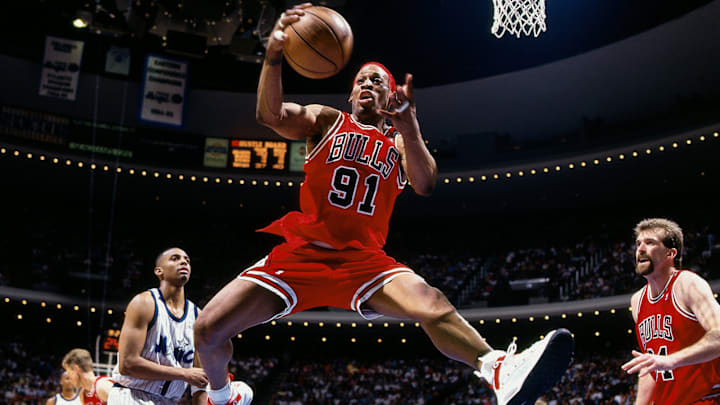Dennis Rodman: The Tale of Basketball's Bad Boy as a Darling Among Collectors

Dennis Rodman, known as "The Bad Boy" of basketball, earned this reputation due to his bold personality, on-court tenacity, and a lifestyle that constantly defied norms. Rodman’s bad-boy image began with his time on the Detroit Pistons in the late 1980s and early 1990s, where he played a crucial role in a team nicknamed "The Bad Boys" for their physical, aggressive play.
His role as an enforcer and his unapologetically hard fouls against star players were key to the Pistons' success, especially in shutting down opponents like Michael Jordan, Larry Bird, and Magic Johnson. His defensive and rebounding skills made him invaluable, but it was his fierce playstyle, trash talk, and relentless pursuit of victory that made him famous.
Rodman's on-court intensity often led to conflicts with other players, earning him technical fouls and suspensions. His unique physical style—diving for loose balls, rough rebounding battles, and even mind games with opponents—made him a powerhouse, and this relentless approach earned him the NBA Defensive Player of the Year title twice.
His time with the Chicago Bulls alongside Michael Jordan and Scottie Pippen amplified his image, as he played a vital role in their second three-peat championship run in the late 1990s. Even on a team of stars, Rodman’s rebellious nature set him apart.
One of the main reasons Rodman is remembered as the "Bad Boy" is due to his outlandish off-court behavior. Known for dying his hair in bright colors, wearing eccentric clothing, and having numerous tattoos and piercings, Rodman was unlike any other player in the league.
His wardrobe ranged from unconventional to shocking, once even wearing a wedding dress to promote his autobiography. Rodman was open about his relationships with high-profile figures, including celebrities like Madonna and actress Carmen Electra, adding to his mystique. His romances, combined with his unpredictability, kept fans and the media intrigued.
Rodman also had a reputation for disappearing before games or during critical moments of the season. One of the most famous examples occurred during the 1997-1998 season, where he disappeared to Las Vegas mid-season for what he described as a mental health break, leaving the Bulls management and fans in shock. His actions challenged traditional expectations for players, particularly during an era when athletes were expected to maintain a strict regimen and a squeaky-clean public image.
Rodman’s willingness to express himself extended to his attitude toward the NBA's authority figures. Known for racking up technical fouls, he frequently clashed with referees, league officials, and even his coaches.
His emotional intensity led to infamous incidents, such as the time he kicked a cameraman in 1997, which resulted in a substantial fine and an 11-game suspension. These confrontations underscored his status as an outsider, as he routinely pushed back against what he perceived as unfair treatment from the league and media.
Beyond the antics, however, Dennis Rodman’s contributions to the game are undeniable. Rodman is known as one of the greatest rebounders in NBA history, he led the league in rebounding for seven consecutive seasons despite being undersized for his role. His sheer athleticism, combined with his uncanny anticipation and strength, made him a nightmare for opponents on the boards.
Rodman's legacy is unique in the world of sports. While many "bad boys" in sports history became notorious for off-court controversies alone, Rodman’s career is remembered just as much for his elite performance on the court as for his unconventional lifestyle. His willingness to embrace his individuality—whether through his clothing, hair, or relationships—changed how athletes could express themselves publicly.
Today, Rodman’s "Bad Boy" persona is viewed as iconic, representing a player who unapologetically lived life on his own terms. His defiance, combined with his undeniable skills, ensured not only his place as one of basketball’s most unforgettable characters but also as one of the most coveted characters among sports card collectors.
Since Dennis Rodman’s basketball cards are highly collectible, there are a few standout choices that are especially prized by collectors and here are his three most sought-after cards:
- 1988-89 Fleer Rookie Card #43
This is Rodman’s official rookie card, released during his first season with the Detroit Pistons. It’s iconic, featuring him in his classic Pistons uniform. High-grade versions are valuable, especially since cards from this era often have centering issues. The PSA 10 version is one of the most sought-after for any Rodman collector.
2. 1992-93 Stadium Club Beam Team Members Only Dennis Rodman #19
The Beam Team cards were a highly popular insert series by Stadium Club, and Dennis Rodman's 1992-93 Members Only card is one of the more valuable ones. Featuring a unique design with holographic elements, this card captures Rodman’s offensive intensity. It’s a great piece for collectors looking for rare and visually stunning 90s inserts.
3. 1997-98 Skybox Metal Universe Precious Metal Gems RED (PMG #107)
The Skybox Metal Universe Precious Metal Gems cards from the Metal Universe series are some of the most coveted cards from the 1990s. Rodman’s PMG card is extremely rare, with only 100 copies produced (90 in Red and 10 in Green), making it one of his most valuable and iconic cards. These cards are considered high-end collectibles, with the PMG Green version being one of the holy grails for 90s card collectors.
Each of these cards represents a significant era of Rodman’s career, making them highly desirable little darlings for both nostalgic and investment-focused collectors.
